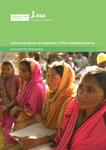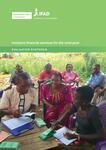Page Header
IFAD's country-level policy dialogue
Overview
The Independent Office of Evaluation of IFAD has just released the evaluation synthesis "IFAD's Country-level Policy Dialogue". The synthesis examines IFAD's engagement with partner governments and other country-level stakeholders. The evaluation synthesis confirms that policy dialogue is an essential dimension of IFAD's mission as it serves two critical purposes: (i) helping to create an enabling environment for project implementation and for achieving project impact; and (ii) contributing to creating the conditions for large numbers of rural people to move out of poverty. From a global perspective, the 2030 Agenda for Sustainable Development calls for the empowerment of vulnerable people by removing the barriers and obstacles they face. This means rooting poverty eradication in the principle of inclusion and the recognition of poor and other excluded groups as agents of their own development. Looking ahead, the growing number of IFAD country offices offers new opportunities for IFAD to be more involved in country-level policy dialogue processes. This will require that more incentives, resources and information be provided to country-level staff with more explicit links to monitoring policy dialogue activities.Report Details
| Year Published | |
| Type | |
| Joint | No |
| Partner/s | N/A |
| Consultant name | |
| Agency Focal Point | Miguel Torralba |
| Focal Point Email | m.torralba@ifad.org |
| Managed by Independent Evaluation Office | Yes |
YOU 'RE READING
IFAD's country-level policy dialogue











